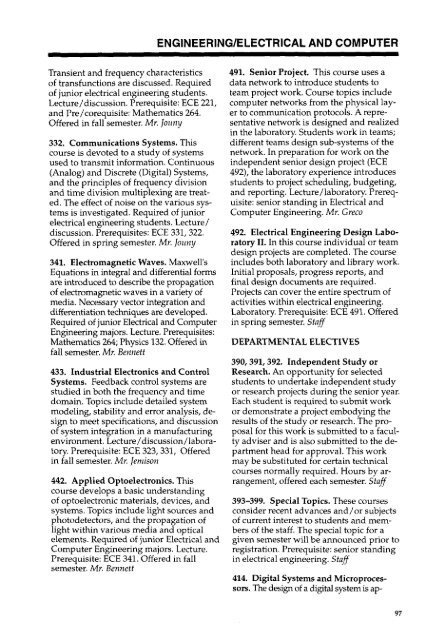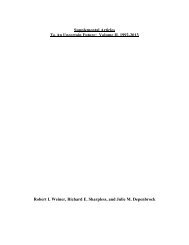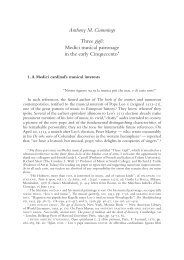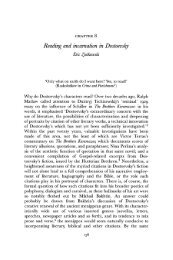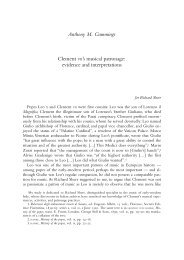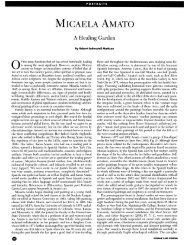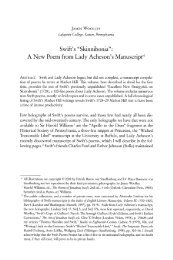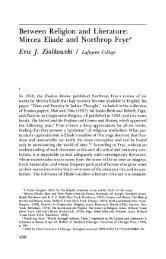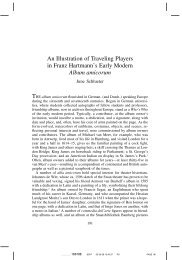courses of instruction - Lafayette College
courses of instruction - Lafayette College
courses of instruction - Lafayette College
You also want an ePaper? Increase the reach of your titles
YUMPU automatically turns print PDFs into web optimized ePapers that Google loves.
Transient and frequency characteristics<br />
<strong>of</strong> transfunctions are discussed. Required<br />
<strong>of</strong> junior electrical engineering students.<br />
Lecture/discussion. Prerequisite: ECE 221,<br />
and Pre/corequisite: Mathematics 264.<br />
Offered in fall semester. Mr. Jouny<br />
332. Communications Systems. This<br />
course is devoted to a study <strong>of</strong> systems<br />
used to transmit information. Continuous<br />
(Analog) and Discrete (Digital) Systems,<br />
and the principles <strong>of</strong> frequency division<br />
and time division multiplexing are treat<br />
ed. The effect <strong>of</strong> noise on the various sys<br />
tems is investigated. Required <strong>of</strong> junior<br />
electrical engineering students. Lecture/<br />
discussion. Prerequisites: ECE 331, 322.<br />
Offered in spring semester. Mr. Jouny<br />
341. Electromagnetic Waves. Maxwell's<br />
Equations in integral and differential forms<br />
are introduced to describe the propagation<br />
<strong>of</strong> electromagnetic waves in a variety <strong>of</strong><br />
media. Necessary vector integration and<br />
differentiation techniques are developed.<br />
Required <strong>of</strong> junior Electrical and Computer<br />
Engineering majors. Lecture. Prerequisites:<br />
Mathematics 264; Physics 132. Offered in<br />
fall semester. Mr. Bennett<br />
433. Industrial Electronics and Control<br />
Systems. Feedback control systems are<br />
studied in both the frequency and time<br />
domain. Topics include detailed system<br />
modeling, stability and error analysis, de<br />
sign to meet specifications, and discussion<br />
<strong>of</strong> system integration in a manufacturing<br />
environment. Lecture/discussion/labora<br />
tory. Prerequisite: ECE 323, 331, Offered<br />
in fall semester. Mr. Jemison<br />
442. Applied Optoelectronics. This<br />
course develops a basic understanding<br />
<strong>of</strong> optoelectronic materials, devices, and<br />
systems. Topics include light sources and<br />
photodetectors, and the propagation <strong>of</strong><br />
light within various media and optical<br />
elements. Required <strong>of</strong> junior Electrical and<br />
Computer Engineering majors. Lecture.<br />
Prerequisite: ECE 341. Offered in fall<br />
semester. Mr. Bennett<br />
ENGINEERING/ELECTRICAL AND COMPUTER<br />
491. Senior Project. This course uses a<br />
data network to introduce students to<br />
team project work. Course topics include<br />
computer networks from the physical lay<br />
er to communication protocols. A repre<br />
sentative network is designed and realized<br />
in the laboratory. Students work in teams;<br />
different teams design sub-systems <strong>of</strong> the<br />
network. In preparation for work on the<br />
independent senior design project (ECE<br />
492), the laboratory experience introduces<br />
students to project scheduling, budgeting,<br />
and reporting. Lecture/laboratory. Prereq<br />
uisite: senior standing in Electrical and<br />
Computer Engineering. Mr. Greco<br />
492. Electrical Engineering Design Labo<br />
ratory II. In this course individual or team<br />
design projects are completed. The course<br />
includes both laboratory and library work.<br />
Initial proposals, progress reports, and<br />
final design documents are required.<br />
Projects can cover the entire spectrum <strong>of</strong><br />
activities within electrical engineering.<br />
Laboratory. Prerequisite: ECE 491. Offered<br />
in spring semester. Staff<br />
DEPARTMENTAL ELECTIVES<br />
390, 391, 392. Independent Study or<br />
Research. An opportunity for selected<br />
students to undertake independent study<br />
or research projects during the senior year.<br />
Each student is required to submit work<br />
or demonstrate a project embodying the<br />
results <strong>of</strong> the study or research. The pro<br />
posal for this work is submitted to a facul<br />
ty adviser and is also submitted to the de<br />
partment head for approval. This work<br />
may be substituted for certain technical<br />
<strong>courses</strong> normally required. Hours by ar<br />
rangement, <strong>of</strong>fered each semester. Staff<br />
393-399. Special Topics. These <strong>courses</strong><br />
consider recent advances and/or subjects<br />
<strong>of</strong> current interest to students and mem<br />
bers <strong>of</strong> the staff. The special topic for a<br />
given semester will be announced prior to<br />
registration. Prerequisite: senior standing<br />
in electrical engineering. Staff<br />
414. Digital Systems and Microproces<br />
sors. The design <strong>of</strong> a digital system is ap-


